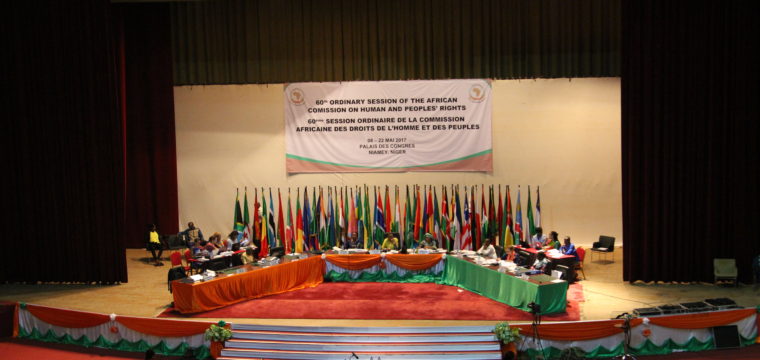
27 November, 2018
Premier African Human Rights Body Sets Standards on Freedom of Association and Assembly on the Continent
New guidelines provide authoritative guidance to African States on how to ensure that the right to freedom of assembly and association is respected and protected in law, policy and practice (the Guidelines).
The Guidelines, adopted by the African Commission on Human and Peoples’ Rights (African Commission) at its 60th Ordinary Session held in Niamey, Niger, were developed with input from an expert Study Group.
The Guidelines offer standards and recommendations to assist States Parties to the African Charter on Human and Peoples’ Rights in ensuring that the rights to freedom of association and peaceful assembly are fully protected and to fulfill their obligations under the African Charter and other international instruments.
The African Commission adopted Resolution ACHPR/Res.151 (c) in November 2009 on the need to conduct a study on freedom of association in Africa. It established a Study Group through Resolution ACHPR/Res.186 (XLIX) in May 2011, which includes the following organisations: the African Center for Democracy and Human Rights Studies (ACDHRS), the Cairo Institute for Human Rights Studies, DefendDefenders (East and Horn of Africa Human Rights Defenders Project), Human Rights Institute of South Africa, the Institute for Human Rights and Development in Africa (IHRDA), the International Service for Human Rights (ISHR), the Réseau des Défenseurs des Droits Humains en Afrique Central, and Réseau Ouest Africain des Défenseurs des Droits de l’Homme.
“These Guidelines are developed in line with the provisions of Article 45 of the African Charter, which mandates the African Commission to formulate and lay down, principles and rules aimed at solving legal problems relating to human and peoples’ rights and fundamental freedoms upon which African Governments may base their laws,” said Honorable Reine Alapini Gansou, Commissioner and Special Rapporteur on Human Rights Defenders in Africa. Gansou chaired the Study Group.
The Guidelines represent a significant gain for African civil society organisations, after years of extensive research and consultations. The Study Group produced a report that was adopted by the African Commission in 2015: “Freedom of Association, as Pertaining to Civil Society, and Freedom of Assembly in Africa: A Consideration of Selected Cases and Recommendations.” In the report, the Study Group recommended to the African Commission to draft and disseminate guidelines on the freedom of association and assembly on the continent in order to fill the gaps in that area.
“Civic space on various countries of the continent is under attack and human rights defenders are being silenced. These Guidelines like other relevant decisions of the African Commission underscore its support to the important work of African civil society organisations; and the African Commission reiterates here its commitment in assisting States Parties to implement their obligations under the African Charter. We hope that they will be a useful tool both for State Parties and civil society organisations,” said Hassan Shire, Executive Director of DefendDefenders and Chairperson of Pan African Human Rights Defenders Network.
In adopting these Guidelines, the African Commission demonstrates its continued efforts to independently and efficiently pursue its mandate to promote and protect human and peoples’ rights on the African continent.
“These guidelines provide guidance to States Parties on measures to be taken to create a conducive environment for human rights defenders and civil society organisations to fully enjoy their rights to association and assembly. It is therefore important that States use these Guidelines as a framework for amending national laws on the rights to association and assembly,” said Clément Voulé, Africa Advocacy Director, International Service for Human Rights.
The adoption of the Guidelines supports the Declaration of the 1st African Union Ministerial Conference on Human Rights in Africa, known as the Kigali Declaration, which explicitly recognises the important role of civil society organisations (CSOs) in general and human rights defenders in particular, in the promotion and protection of human rights in Africa. It also calls upon Member States and regional institutions to protect CSOs and encourages the participation of CSOs in decision-making processes, with the aim of consolidating participatory democracy and sustainable development.
Progress made by State Parties with regards to the promotion and protection of the rights to freedom of peaceful assembly and association will be monitored and reported on in relation to the Guidelines to the African Commission.
We would like therefore, to express our gratitude to partners who offer their technical assistance and resources to achieve this goal. Moreover, our appreciation to the Republic of Benin, the Republic of Cote d’Ivoire, the Republic of Ghana, and the Republic of Togo for hosting different meetings of the Study Group.
For more information contact Joseph Bikanda ([email protected]) or Clément Voule ([email protected]).
- African Center for Democracy and Human Rights Studies (ACDHRS);
- DefendDefenders (East and Horn of Africa Human Rights Defenders Project);
- Cairo Institute for Human Rights Studies (CIHRS);
- Human Rights Institute of South Africa (HURISA);
- Institute for Human Rights and Development in Africa (IHRDA);
- International Service for Human Rights (ISHR);
- Réseau des Défenseurs des Droits Humains en Afrique Central;
- Réseau Ouest Africain des Défenseurs des Droits de l’Homme.



